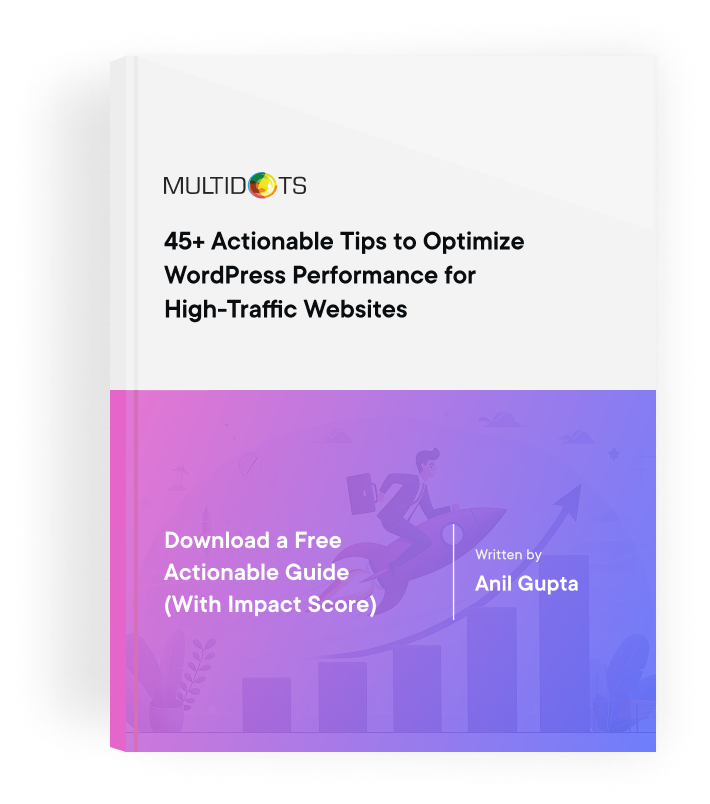Drupal vs WordPress vs Sitecore Which CMS is Best for Your Business?
Compare Drupal, WordPress, and Sitecore to determine which CMS is the best fit for your business needs and goals
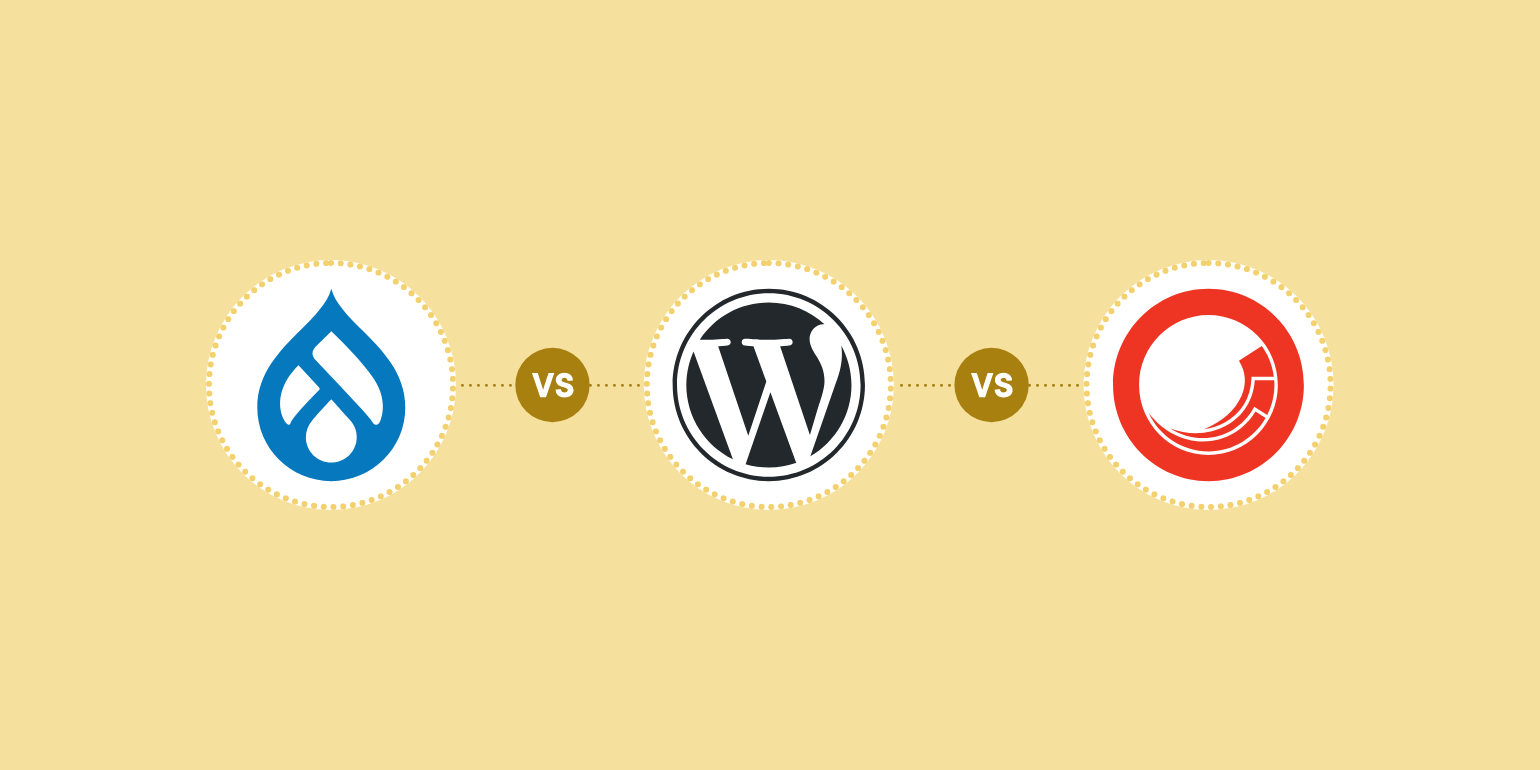
Table of Contents
In the post-COVID times that we live in, where everyone is moving towards digitization, your website is at the heart of your business. And, the content of your business website acts as the gateway to your target audience seeking information.
This is why picking the right CMS for your business website is not something that you can take lightly or go with the crowd.
As an enterprise with immense potential for scalability—creating, editing, and distributing content would be a significant part of maintaining your website.
Hence, a hit or miss with your website CMS may put you in significant monetary losses and hinder the growth of your business. So treading with caution is of utmost importance here.
If you’ve been researching the CMS market, then WordPress, Drupal, and Sitecore may be the names that came up often. Whether you are on the lookout for a CMS to launch your brand new business site or looking to migrate from your current CMS, we’ve got you covered.
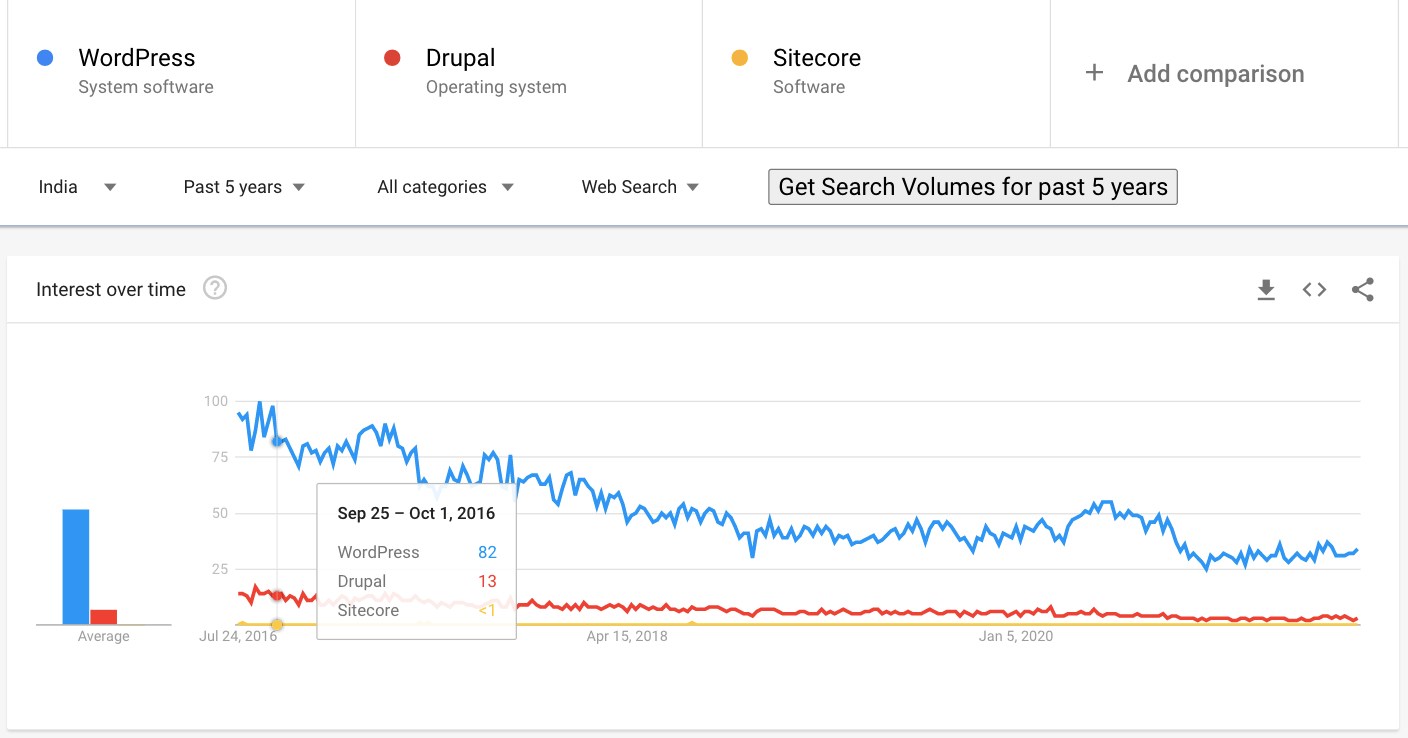
In this extensive guide, we compare the top three most popular CMS choices for enterprises—Drupal, Sitecore, and WordPress. Here, we’ll break down every aspect of the CMS for you to pick the best one based on the specific needs of your business.
Choosing a CMS is not an easy affair as there is no "best CMS '' out there. Many aspects are subjective and the "best" choice is based on your business’ requirements and goals.
By the end of this article, you’ll be able to make an informed decision about the best CMS option to go with that will help you hit your short-term and long-term goals.
Open-Source vs. Closed-Source
Before we begin comparing the CMS, it’s important to understand the difference between open-source and closed-source CMS.
| Comparison aspects | Open-Source CMS | Closed-Source CMS |
|---|---|---|
| Code availability | The open-source CMS code is available to everyone for free. Developers are free to update, improve, and expand the source code to suit their needs. | The code of a closed-source CMS is accessible only to the original authors. Businesses can pay a licensing cost to use the CMS features, but they cannot modify the code. |
| Community | Since the code is available for the public, you can expect community support. Developers can upgrade the current CMS code and fix any bugs. | There is no community support in closed-source CMS, and you’d have to rely on the support team to resolve any issues. |
| Security | Security issues may arise in the case of open-source CMS because the code is open for hackers to practice. | Restrictions on the availability of code make it difficult for hackers to plan attacks. Hence, you can expect a very high level of security with a closed source CMS platform. |
| Customer Support | You cannot expect any prompt customer support in case of issues and bugs with open source CMS code. Instead, you have to rely on forums or hire CMS experts to fix these bugs. | You can expect premium customer support when you opt for a closed CMS platform. |
| Pricing | Open-source CMS is usually available for free. You may only have to pay for hosting, additional plugins, or developers. | In the case of closed source CMS, you have to pay a hefty license cost to gain access to the CMS features apart from extra expenses. |
| Examples | WordPress, Drupal | Sitecore |
As mentioned in the above table, WordPress and Drupal are popular open-source CMS platforms, while Sitecore is a closed-source one. Having this knowledge may already help you eliminate the ones that may not suit your business needs.
Now let’s have a closer look at each CMS and its key aspects for comparison—market share, website examples, key features, pros and cons, and integrations.
Drupal
Drupal is a 20-year old open-source CMS platform proudly known to offer the best digital experience on the web. Drupal has a track record of continuous innovation, with Drupal 9 being the newest version.
Drupal partners with various hosting providers to offer a wide range of solutions—shared hosting, enterprise hosting, cloud hosting, VPS hosting, dedicated hosting, and reseller hosting.
Drupal CMS Market Share and Usage Statistics
Drupal powers 1 in 30 websites or 3.33% of websites around the web. When you compare the market position of Drupal in terms of usage and traffic, then you’ll find that Drupal CMS usage is relatively lower.
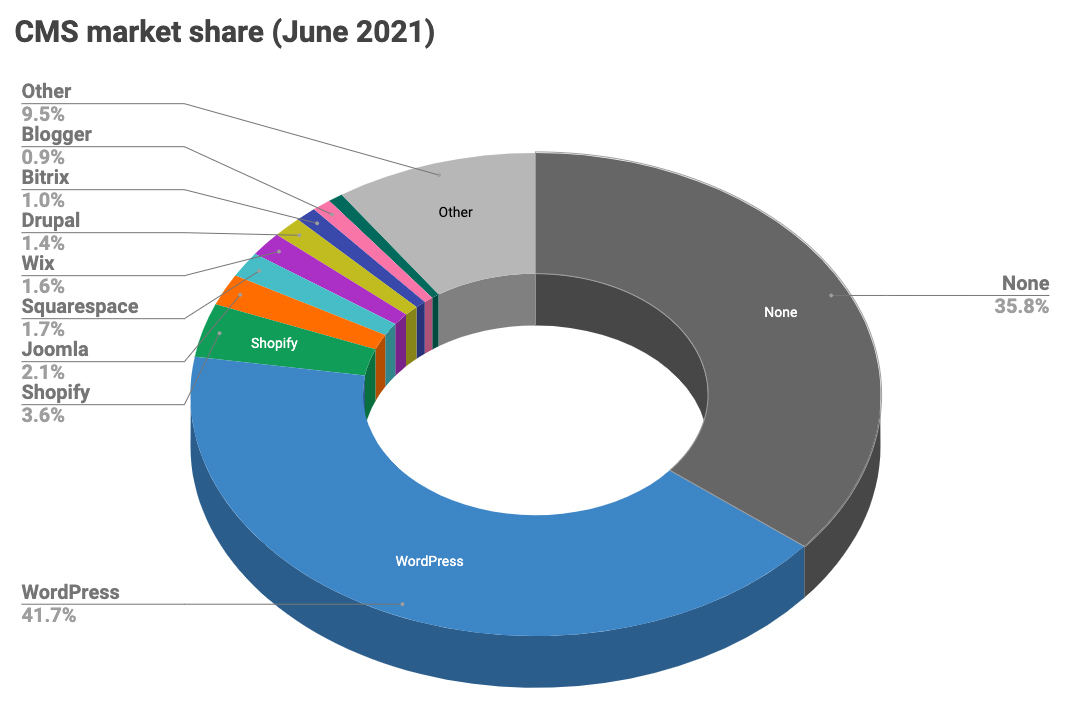
However, Drupal powers many high-traffic sites, which says a lot about the CMS’s performance, security, and enterprise-focused features.
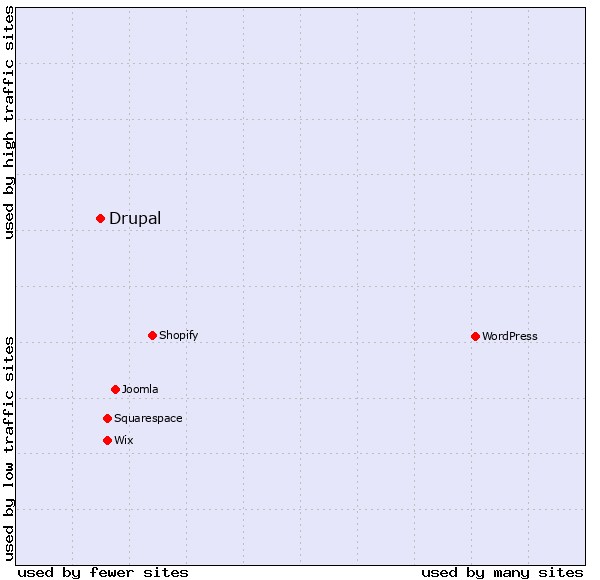
Drupal boasts of a powerful open-source community with over 122,000+ active contributing members. Top contributors include companies such as Acquia, Third And Grove, Acro Media, Media Current, and many more. This says a lot about the popularity of the CMS amongst top developers worldwide.
Drupal CMS Top Websites
Here’s a list of top websites using Drupal as their CMS platform:
- NASA
- OXFAM
- Doctors Without Borders
- ABS-CBN News
- The Australian Government website
- Keap
- The Emmy Awards
- NCAA
- Tesla
- Entertainment Weekly
- University of Colorado
- The Economist
Drupal CMS Features
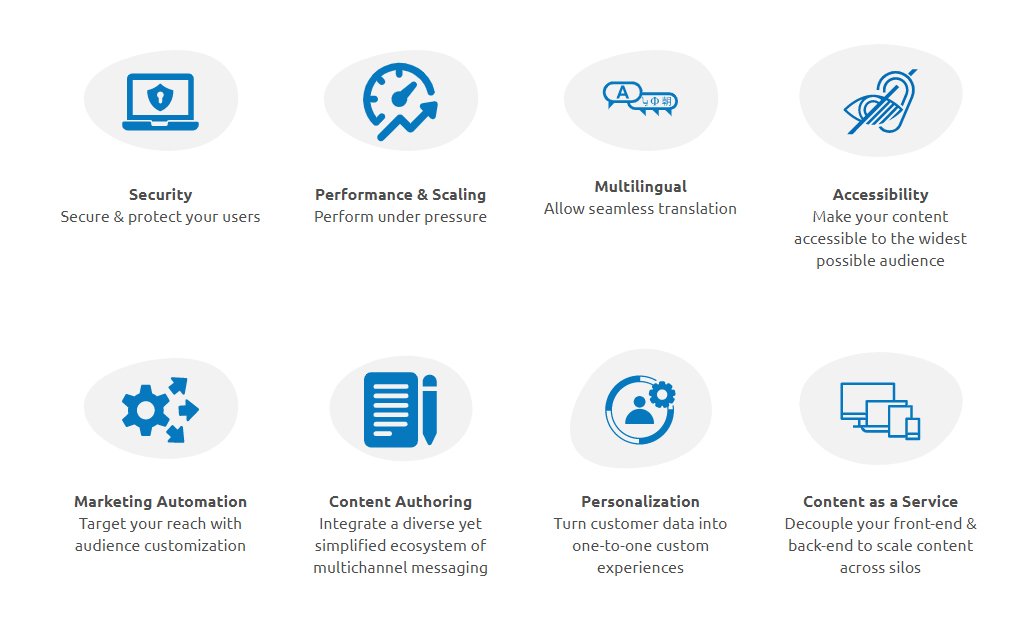
Content Authoring
Using Drupal CMS, you can manage and publish multimedia content across multiple channels. Multiple authors can work on content simultaneously and deploy it easily across various channels.
Drupal also allows for integrations with important marketing tools, making it a one-stop solution for creating enterprise-wide content campaigns under the same brand. Content personalization and retargeting are other additional features you’d love.
Personalization
Drupal allows you to create unique personalized profiles for every site visitor based on data such as clicks, decisions, geolocation, browser history, etc.
You can use this to segment and target users with personalized messaging, leading to better conversions and ROI. You can also conduct A/B and multivariate testing.
Performance and Scalability
It is common for enterprises to see sudden spikes in website traffic. So, choosing a CMS that allows you to handle such spikes is crucial.
Drupal’s performance features help your business website perform well under such unforeseen, high-load situations. Drupal also allows you to improve website performance by offering lower page speed load times.
Marketing Automation
If you’re expanding your business with the need to manage a large amount of content while focusing on scalability, marketing automation is a must.
Drupal helps you create powerful marketing automation workflows and manage data in bulk. This can help you save a significant amount of time and money.
Security
Drupal CMS comes with advanced security features and claims to be "resilient against critical internet vulnerabilities." In fact, their dedicated security team takes care of identifying and mitigating any cybersecurity risks.
This is probably why many governments, banking, public administration, and healthcare companies use Drupal as their CMS.
With the Drupal CMS platform, you get some of the most important security features such as user access control, DB encryption, protection against DoS attacks and malicious data entry, security patches, security reports, etc.
Multilingual Support
If your business is international, then having multilingual capabilities without compromised user experience is vital.
Drupal allows for automated language translation and international SEO. Drupal also allows for automatic detection of preferred language, thus helping you offer a premium user experience.
Accessibility
With Drupal, you do not have to worry about website accessibility penalties and lawsuits. There is no need for an additional accessibility tool or plugin as Drupal comes with built-in website accessibility features to help you reach 100% of your audience.
Modules
Drupal CMS comes with a wide range of add-ons, otherwise known as Drupal modules, to help you add additional functionalities to your website.
The Drupal directory consists of 47k+ modules in total. However, only 10k+ of these modules are compatible with Drupal 8+ versions.
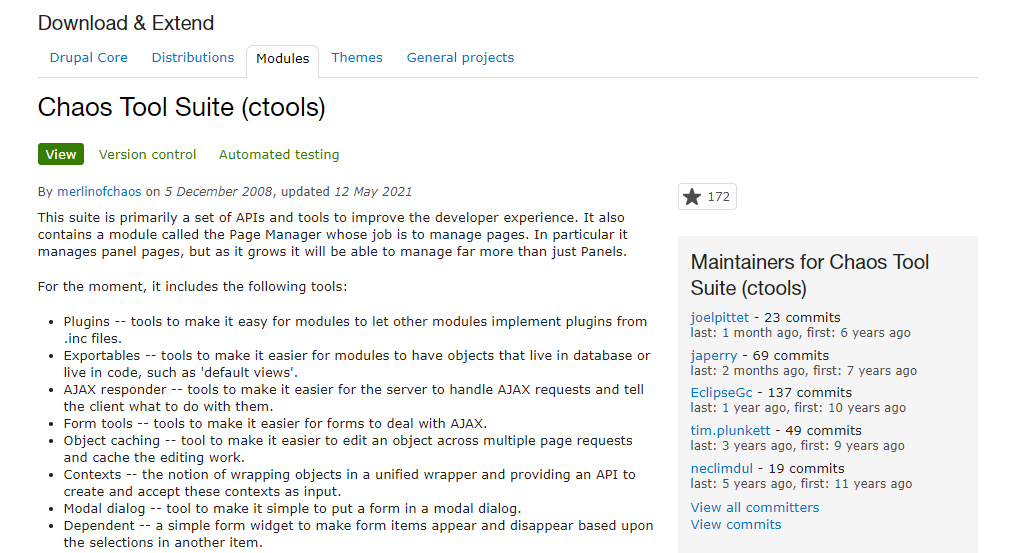
Themes
Drupal also comes with some ready-to-use themes that will help significantly reduce your development costs. The official Drupal directory lists 2,965 themes, out of which 576 are compatible with Drupal 8+ versions.
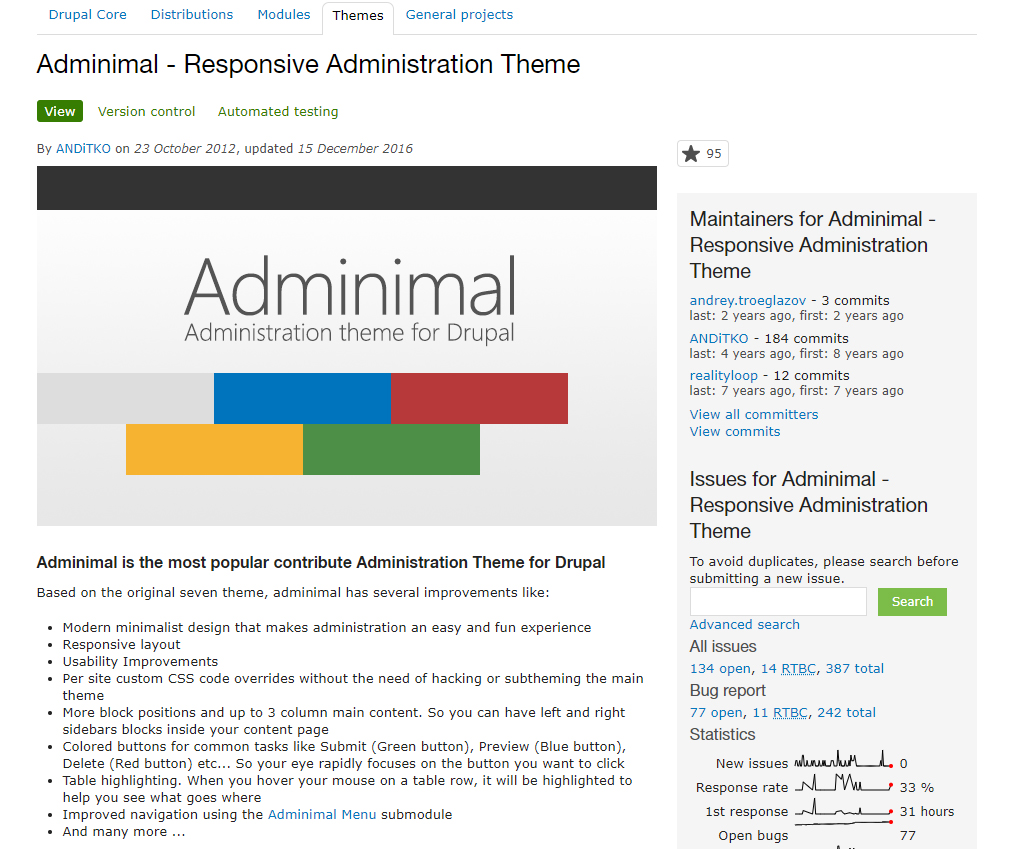
Drupal CMS Pros
Now that you understand the features that Drupal has to offer, let’s have a look at the advantages of using Drupal CMS:
- Drupal CMS offers custom content types/capabilities that are more flexible compared to other CMS like WordPress. Drupal supports blog posts, news, informational pages, polls, etc.
- Drupal is an open-source CMS that makes it easier for you to upgrade its features to best suit your needs. There is also a strong community of active contributors to back Drupal. These developers constantly offer assistance free of cost.
- Drupal comes with advanced security features out-of-the-box, which makes it a perfect choice for security-conscious businesses.
- Drupal is built with scalability and performance in mind. The platform is capable of handling massive traffic spikes.
- Drupal core comes with multilingual support out-of-the-box, and you do not need any additional integrations or modules for the same.
- With Drupal, you can have more control over access and user permissions. Its built-in access control system allows you to create custom user roles with different permissions. This feature can be highly beneficial for enterprises where access control can be a major issue.
- Experts consider Drupal’s taxonomy system to be more flexible than other CMS. This makes the content organization much easier. You can group your content together in various configurations.
Drupal CMS Cons
Drupal, just like any other CMS, comes with a set of disadvantages that you must be aware of before making your final choice:
- Drupal isn’t exactly beginner-friendly, unlike CMS such as WordPress. You need to have a basic understanding of PHP, HTML, and CSS to create a Drupal website. Plus it also comes with a steep learning curve for understanding the basic functions of the platform. Hence, you may need to have the support of expert Drupal developers to create a competitive business website.
- Though Drupal comes with a wide array of themes, most of these are custom-coded. Hence, you would still need support from Drupal developers to work with the themes.
- Drupal comes with add-on modules that can extend the functionality of the platform. However, you may have to pay for most of these modules, and you may have to spend a great deal of time searching for the best ones.
- Drupal has a vast directory of modules and themes. However, only a few of these are compatible with Drupal 9+ versions.
- With Drupal CMS, module compatibility may be a problem. Often users complain about modules conflicting with each other. Running incompatible modules together may even crash your entire website.
- Apart from website setup and hosting costs, you’ll have to invest in maintenance and support costs in the case of Drupal CMS. These costs may significantly add up over time.
Top Enterprise Integrations Offered by Drupal CMS
Here’s a list of top enterprise integrations offered by Drupal CMS:
- Yoast
- Salesforce
- Mailchimp
- HubSpot
- Google Analytics
- SugarCRM
- Tableau
- Smartling
- Shopify
- Brightcove
WordPress
WordPress is, no doubt, the most popular CMS platform available on the web. In fact, WordPress powers over 40% of websites around the web, which is massive!
You’d be surprised to know that WordPress started as a blogging platform in 2003. It was a popular blogging platform amongst hobby bloggers (it still is!)
However, over the years, the WordPress community grew and has become a popular CMS option for most businesses—SMBs as well as huge enterprises.
WordPress CMS Market Share and Usage Statistics
Here’s a look at the market position of WordPress in terms of popularity and traffic:
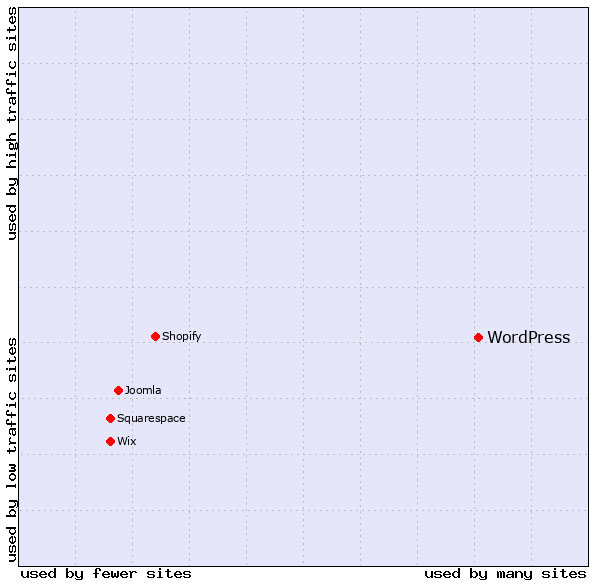
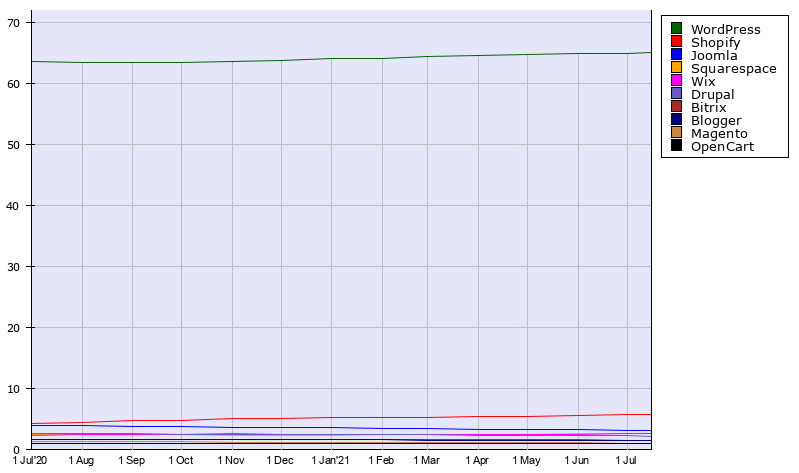
You’d notice that WordPress is way high up and almost untouchable in terms of market share and popularity. In fact, WordPress holds a 38.03% market share amongst the top 10K websites around the web.
| All Websites | CMS Market | |
|---|---|---|
| WordPress | 40% | 64% |
| Joomla | 2.6% | 4.6% |
| Drupal | 1.7% | 3.0% |
| Squarespace | 1.5% | 2.7% |
| Wix | 1.3% | 2.3% |
WordPress CMS Top Websites
Here’s a list of popular websites around the web that are powered by WordPress CMS:
- TechCrunch
- The Official Star Wars blog
- Whitehouse.gov
- Sony Music
- BBC America
- MTV News
- The New York Times
- University of Washington
- The Walt Disney Company
- The Rolling Stones
- Katy Perry Official Website
- Mercedes Benz
- The New Yorker

WordPress CMS Features
WordPress CMS comes with basic features out-of-the-box. However, you can explore the platform's true potential through various plugin and theme options available for the users.
In this section, let’s have an in-depth look at the different features offered by WordPress CMS and the extended capabilities offered by WordPress themes and plugins.
Customizable Designs
WordPress comes with a massive library of 8k+ free and paid themes! So you have the flexibility to pick and choose a theme that caters precisely to your business needs and design requirements.
Furthermore, these themes offer customizable design options so you can tailor the theme exactly to your branding.
SEO Friendly Features
WordPress comes with limited built-in Search Engine Optimization (SEO) features. However, you can expand the platform's SEO capabilities through popular SEO plugins such as All-In-One SEO, Yoast, RankMath, WP Rocket, and many more. These powerful SEO plugins offer both basic and advanced SEO customization options for your business site.
Personalization
WordPress is a highly flexible CMS solution, due to which you can integrate the platform with top personalization and marketing automation tools to offer premium experiences to your website visitors.
Audit Trails and Workflows
For an enterprise-grade, CMS, audit trails, and custom workflows are an absolute necessity. As with the other features in this list, WordPress, at its core, lags behind in terms of these advanced features.
However, WordPress presents you with a range of powerful plugins that offer these additional features in a cost-effective manner.
Enterprise Scalability
While other enterprise-grade CMS solutions may need custom development, WordPress comes with great enterprise CMS capabilities with limited custom development needs. This is possible due to the powerful repository of plugins and third-party integrations that the platform offers.
Flexibility
Flexibility is a huge plus in WordPress CMS, which probably makes it such a popular CMS option amongst all kinds of businesses.
In comparison to WordPress, other CMS such as Drupal and Sitecore may seem somewhat rigid and inflexible. We can attribute the flexibility of WordPress to the thousands of plugins, themes, and integrations that the CMS’s ecosystem has to offer.
Reliable Security
Security is often cited as WordPress’s weakness owing to some past security exploits, but this perspective is skewed. In reality, WordPress tends to get hacked more simply because there are more WordPress sites on the internet.
The WordPress security team does a great job of keeping the platform secure by working with leading experts and hosting companies, performing frequent safety audits, and monitoring for new issues. As soon as a vulnerability is detected, they swiftly push out security updates that get applied automatically for all websites that don’t explicitly turn this feature off.
So, negligence on the owner’s part — weak passwords, unreliable hosting, or outdated plugins — is what leads to successful breaches. If you follow all the basic security measures diligently, WordPress in itself is a secure CMS.
WordPress CMS Pros
Now that you have a better idea about the market usage and features that WordPress CMS offers, let’s have a look at the advantages of using WordPress CMS:
- WordPress is highly beginner-friendly. Anyone and everyone with negligible technical knowledge can build a powerful business website from scratch using WordPress. Hence, you may eliminate the need for custom development altogether.
- With WordPress, costs are significantly reduced compared to platforms such as Drupal and Sitecore. You may need to consider development costs, hosting costs, other additional costs for third-party tools, paid themes, and paid plugins. Even then, the costs are usually lower compared to other CMS platforms as you save a significant amount of development and maintenance costs.
- As mentioned in the previous section, the WordPress library offers 8k+ themes and 58k+ plugins, making it easier for you to extend your website functionalities without relying on custom development.
- WordPress is backed by a massive global community consisting of active contributors adding to the platform’s functionalities. The WordPress community support makes it easier for you to find quick support on forums. It also makes it easier for you to find and hire skilled WordPress developers at affordable rates.
- Quick and easy deployments are another huge plus in the case of WordPress CMS.
WordPress CMS Cons
- Since WordPress comes with only a few features out-of-the-box, you may spend a significant amount of money and time hunting for the perfect themes, plugins, and third-party tools that will be a perfect add-on for your WordPress website.
- Having numerous plugins and themes may slow down your WordPress website performance. In addition, the frequent plugin and theme updates may be annoying and even give rise to some glitches in your website.
WordPress CMS Top Enterprise Integrations
As discussed above, WordPress CMS is a highly flexible platform, and hence it comes with seamless integrations capabilities with almost every popular software available in the market.
Also, there is always an option to hire WordPress developers to help you integrate your WordPress website backend with the tools of your choice.
To give you an idea, here’s a brief list of top enterprise integrations offered by WordPress CMS:
- Salesforce
- Mailchimp
- Trello
- Slack
- Toggl Track
- Hubspot
- Intercom
- LeadPages
- ClickFunnels
- ConvertKit
- CoSchedule
- Buffer
- Quickbooks
Sitecore
Sitecore is the unique one from this list as it is an enterprise-level closed source CMS platform that offers an all-around digital experience to its customers.
The platform focuses on providing rich content and experiences to your customers. It stands out from the list by being a more commercial and standalone CMS platform.
Sitecore is a versatile commercial digital experience platform that caters to a wide range of industries—government, finance, healthcare, eCommerce, logistics, non-profits, IT, and many more.
The Sitecore platform consists of four core products that together merge to form the Sitecore Experience Cloud:
- Sitecore Experience Platform: This product offers various features focussed on customer experience—personalization, marketing automation, omnichannel data capture, A/B testing, along with advanced CMS capabilities.
- Sitecore Experience Commerce: This product offers advanced eCommerce features with a special focus on customer experience and personalization.
- Sitecore Experience Manager: This product helps manage multiple sites, multilingual support, and omnichannel content delivery.
- Sitecore Content Hub: The content hub allows you to manage and streamline content operations across the organization through digital asset management, marketing resource management, and content marketing platform.
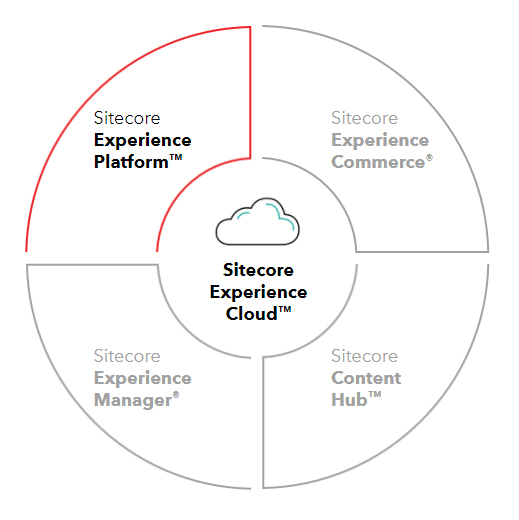
You can refer to this resource where Sitecore offers an in-depth comparison of its product features
Sitecore CMS Market Share and Usage Statistics
Sitecore platform powers around 121k+ websites across the web. Here’s a comparison of Sitecore CMS market position with other leading CMS platforms in the terms of traffic and popularity:
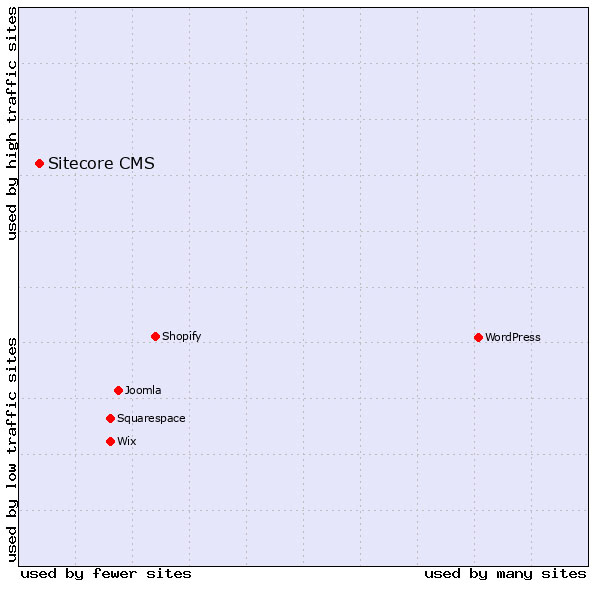
From this comparison, you would notice that very few websites use Sitecore when compared to popular CMS like WordPress. However, a large chunk of these websites consists of commercial websites that drive massive traffic each month.
For example, Xfinity drives 176M+ website visits each month. Similarly, Mayoclinic.org drives 141M+ monthly visits, and so on. We can attribute these usage statistics to the commercial, enterprise-level features offered by the Sitecore Experience Cloud.
Sitecore CMS is popular among various terms of industry verticals—finance, health, computers, and engineering.
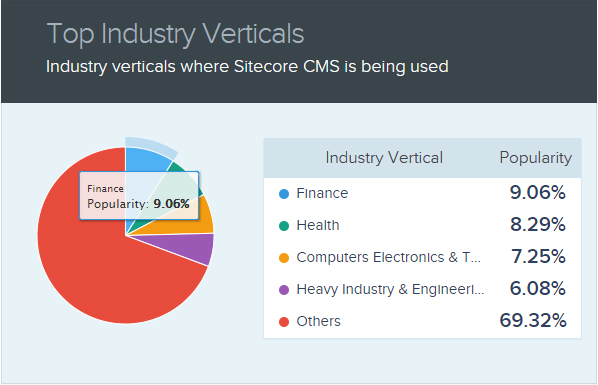
Sitecore CMS Top Websites
Here’s a list of popular websites across the web using the Sitecore CMS platform:
- PUMA
- Millennium Hotels and Resorts
- Loreal
- Xfinity
- UnitingCare Queensland
- Nestle Purina Petcare
- Komatsu Australia
- Foodstuffs North Island Ltd
- Village Roadshow Theme Parks
- LastPass
- ISACA
- Microsoft Partner Network
- Project Management Institute
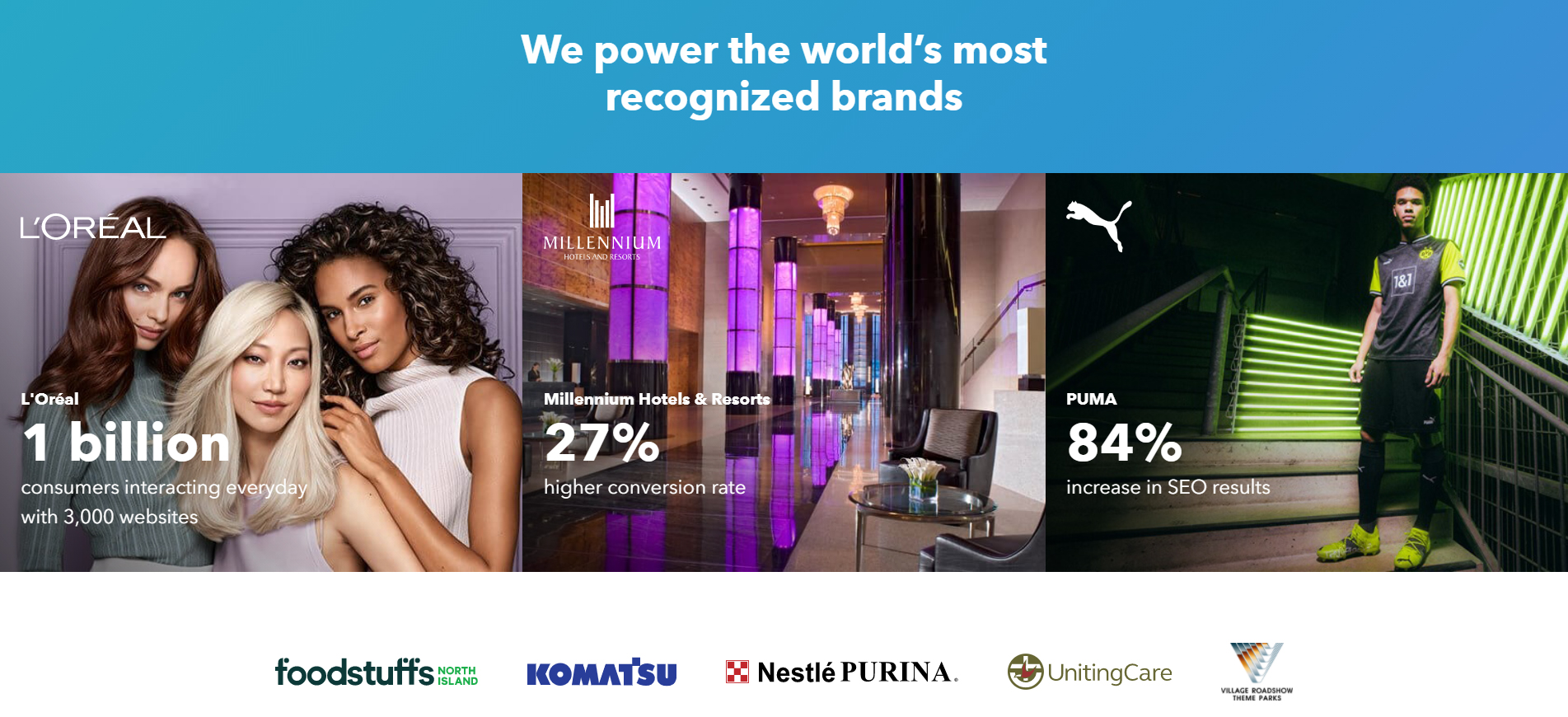
Sitecore CMS Features
As discussed in the sections above, Sitecore CMS consists of four core products. Therefore, in this section, we’ll look into each product’s features separately to help you have a better understanding of the CMS platform.
Sitecore Experience Platform Features
- Deliver omnichannel content across devices, channels, and touchpoints.
- Use AI auto-personalization to segment site visitors and offer a unique 1-on-1 experience.
- Capture customer insights and use them to serve better content and interactions with customers.
- Create marketing automation workflows using an easy drag and drop interface.
- Make use of rapid deployment options for speedy delivery.
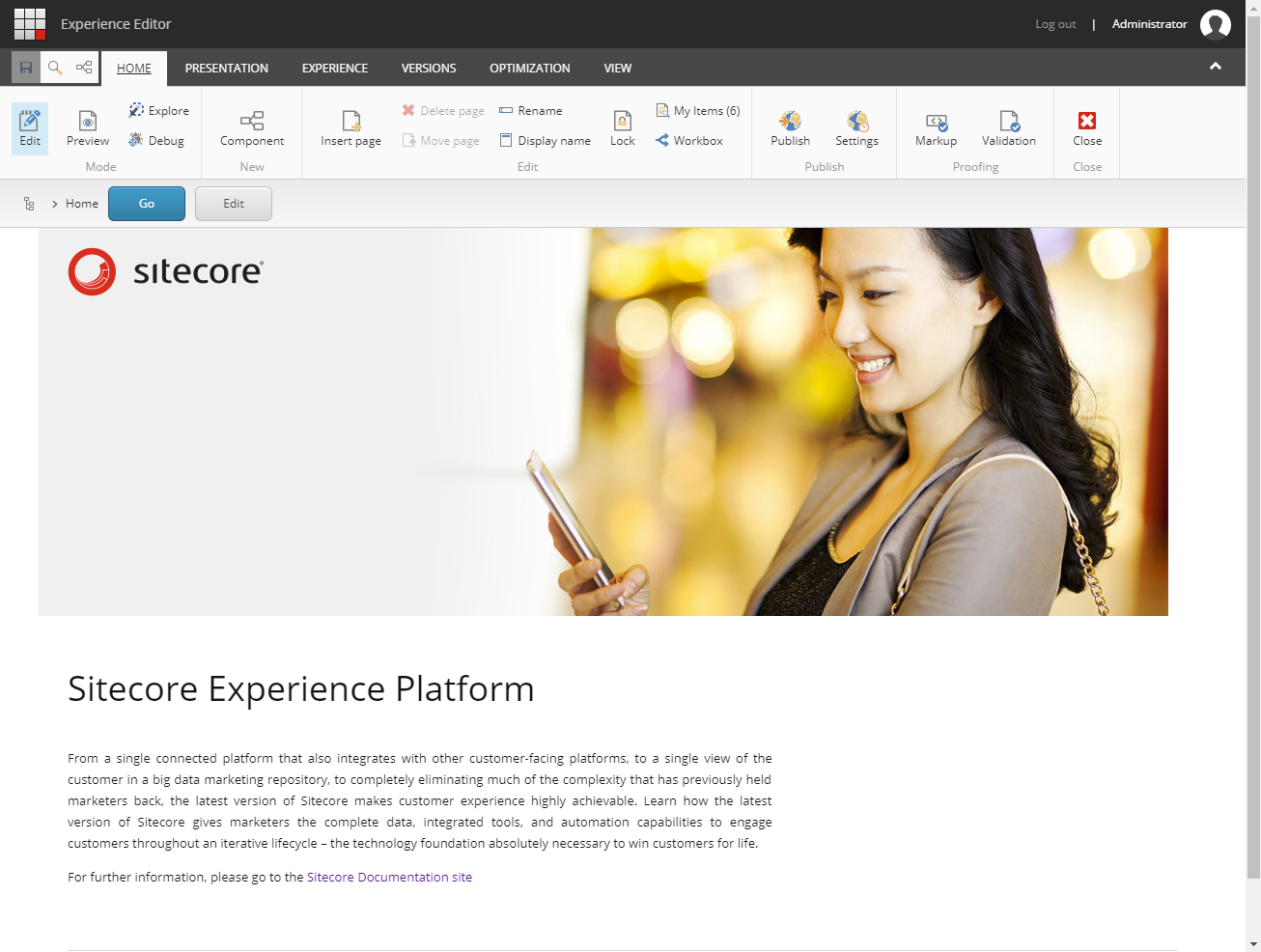
Sitecore Commerce Features
- Create tailored shopping experiences for site visitors.
- Manage and deliver omnichannel content across platforms.
- Automate eCommerce back-end processes such as inventory management and fulfillment.
- Make use of the active Sitecore Commerce developer community to speed up and simplify the development process.
Sitecore Experience Manager Features
- Use Sitecore’s multilingual support and manage and deliver content to an international audience.
- Handle content across multiple sites.
- Distribute content seamlessly across multiple websites, platforms, and channels.
- Make use of user-friendly content editing tools, drag-and-drop templates, and visual previews for content operations.
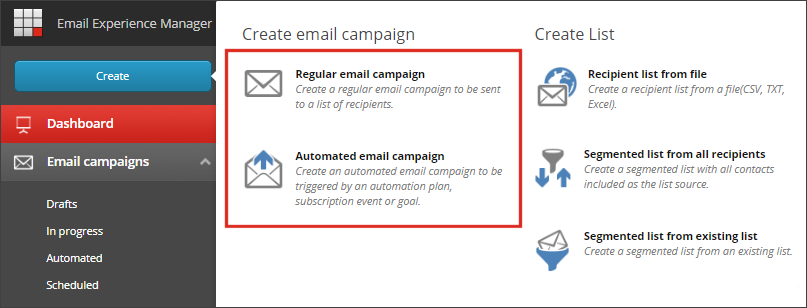
Sitecore Content Hub Features
- Centralize all your marketing assets with Digital Asset Management (DAM) solution.
- Gain visibility and improve collaboration efficiency through Marketing Resource Management (DRM) solution.
- Use Sitecore’s built-in Content Marketing Platform to plan content strategy, visualize content needs, and track editorial calendar status.
Sitecore CMS Pros
- Sitecore, being a closed source CMS platform, offers better security compared to other open-source CMS. This is because the code is not available for hackers to practice and identify vulnerabilities.
- Sitecore Experience Cloud acts as a one-stop solution for enterprises looking for something beyond a simple CMS—a commercial digital experience platform with in-built marketing, content management, eCommerce, and personalization features.
- Sitecore’s content editing interface comes with some brilliant features and capabilities out-of-the-box, such as custom content types and content reuse.
- Sitecore CMS comes with some advanced UX features such as customer segmentation, lead scoring, personalization, analytics, and more. You do not have to invest in plugins or third-party tools to gain access to these features.
- Scalability is a definite pro in the case of Sitecore CMS as it is capable of traffic spikes without any special efforts.
- Sitecore offers flexible solutions that cater to a wide range of verticals.
- Sitecore allows you to set up custom publishing workflows and easily track audit trails. You may find these features with other CMS, but with Sitecore, these capabilities are more advanced and intuitive.
Sitecore CMS Cons
- Cost is the most significant disadvantage in the case of Sitecore CMS. If you’re a medium-sized business with a modest budget to spare on a website CMS, then Sitecore is not the right choice for you. Sitecore licensing costs add up to $50k+ annually. Apart from this, you’ll also have to take into account development and maintenance costs.
- Sitecore is a custom CMS solution. Hence, deployments usually need more time and effort compared to other CMS.
- Maintaining a Sitecore website is not easy and convenient as you’d have to depend on technical support for many things.
Sitecore CMS Top Enterprise Integrations
Sitecore CMS offers pre-packaged integrations, also known as Sitecore Connectors, with selected third party software:
- Salesforce
- Microsoft Dynamic 365 for Sales
- Microsoft Dynamic 365 for Retail
This set of enterprise integrations may not suffice your requirements. For this, Sitecore suggests you check the third-party integrations available from Sitecore’s Technical Alliance Program partners. You can get in touch with these partners to implement third-party solutions.
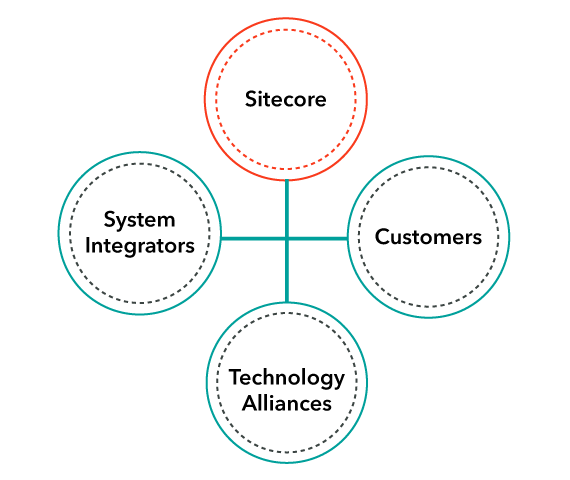
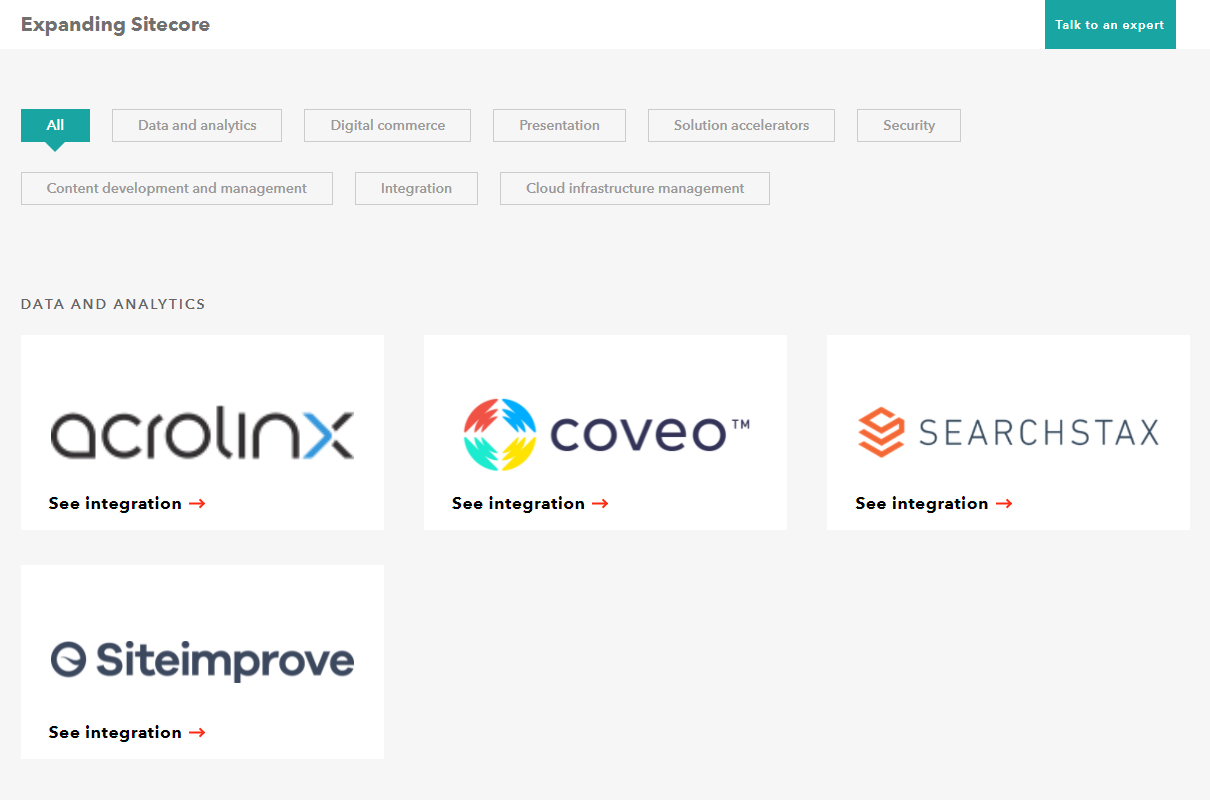
Drupal vs. WordPress vs. Sitecore: Direct Comparison of Key Factors
By now, you know everything there is to know about the market share, features, pros, and cons of every CMS individually. In this section, we’ve combined this into a more compact form by offering a head-to-head comparison of key features provided by these CMS.
Ease of Use
WordPress is a clear winner in terms of ease of use as it is incredibly beginner-friendly and doesn’t necessarily require technical expertise and support.
Sitecore is less easy to use, and you may have to bear with a steep learning curve to learn your way around the platform.
Drupal scores the least in terms of ease of use, as you need to have basic knowledge of PHP, CSS, and HTML to work your way around the platform.
Security
Sitecore and Drupal both score high in terms of security features. These CMS platforms come with advanced security features out-of-the-box. The fact that top security-sensitive organizations, typically from verticals such as banking, finance, government, etc., are proof of this fact.
WordPress scores the least here as it doesn’t come with great security features built-in. But any such lack of security can be easily bridged by taking strict security measures with the help of plugins, and the CMS itself is a secure one.
Cost
WordPress CMS is the one that will cost you the least as you can significantly reduce development and maintenance costs by choosing WordPress over Drupal and Sitecore.
Drupal CMS may cost you more than WordPress as you probably need the help of Drupal developers to build your website. Moreover, Drupal is less popular than WordPress, and hence Drupal experts will cost you more than skilled WordPress developers.
Sitecore will by far be the most expensive CMS option from this list, mainly because of the additional $50k+ annual licensing costs that you’d have to pay.
Flexibility
WordPress tops other CMS in terms of flexibility as it comes with thousands of plugins, themes, and customization options for you to choose from.
Drupal and Sitecore are more rigid CMS platforms in terms of flexibility.
Scalability
Drupal and Sitecore score higher in terms of scalability. This is because these CMS platforms have a proven track record of handling massive traffic spikes for top websites around the web without leaving way for any glitches. This is probably why high-traffic websites prefer these CMS solutions.
WordPress doesn’t come with great scalability features out-of-box. However, the kind of scalability you can achieve on your WordPress website through third-party integrations and plugin options is almost limitless.
Marketing Prowess
All three platforms—WordPress, Drupal, and Sitecore are known to showcase strong marketing prowess.
In the case of Sitecore, powerful marketing features such as personalization, CRM, multilingual support, marketing automation, etc., are in-built and come along with the platform.
In the case of Drupal, you get certain marketing features such as personalization, multilingual support, etc., out-of-box.
WordPress comes with limited marketing capabilities out-of-box. However, you can expand these functionalities using third-party integrations with specialized tools of your choice. In doing so, you pay less to have a better solution and also avoid feature bloat that can happen with unused/unnecessary features built into the CMS, as with Sitecore and Drupal.
Conclusion: So Which CMS is Best For Your Business?
The rather disappointing answer to this question is that there is no best CMS platform out there. As mentioned in the beginning, picking a CMS is highly subjective and totally depends on your business needs and preferences, and so the answer to this question is something only you can deduce.
Through this exhaustive guide, we aim to offer in-depth comparisons between top CMS available in the market today. As the popular saying goes, "knowledge is power." By going through this guide, you’ll have the knowledge to make a wiser, informed decision about the best CMS for your business.
And if you choose to go with WordPress for your enterprise, you’re in the right place.
Feel free to schedule a quick call with our migration expert.
Contact Us